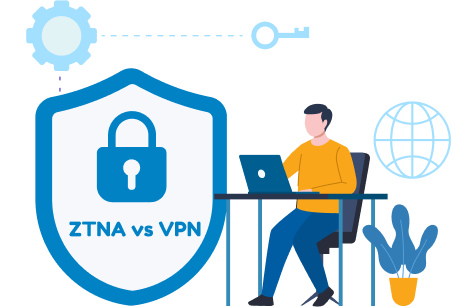ZTNA vs VPN - Compare Features, Benefits, Performance

Table of Contents
- VPNs Legacy and the Rise of ZTNA
- What is the Difference between ZTNA and VPN?
- Zero Trust Remote Access
- ZTNA Solutions
- Zero Trust Network Access vs VPN
- Best ZTNA Solutions
- ZTNA Based Solutions are Superior to VPNs
- ZTNA Solutions Use Cases
- ZTNA is Part of the Future of Secure and Fast Remote Connectivity
- ZTNA Vendors
- How to Migrate from VPN to ZTNA
VPNs Legacy and the Rise of ZTNA
VPNs rely on a perimeter-based security model, drawing a virtual border around a network and allowing access only via trusted connections. While this approach provides protection, it has several drawbacks:
- VPNs are often based on legacy infrastructure, making them vulnerable to multiple attack methods.
- VPNs can introduce latency and reduce network performance, especially for data-intensive applications and video meeting solutions that are now common.
- VPNs are complex to deploy and require ongoing management, placing a burden on IT teams.
- The surge in demand for WFA has resulted in increased requests for access, distracting IT teams from focusing on other important work and IT projects.


What is the Difference between ZTNA and VPN?
ZTNA (Zero Trust Network Access) provides a modern and more effective approach to remote access security. ZTNA takes a granular approach, granting access based on user identity and other contextual factors, ensuring that only authorized users and devices can access specific applications.
ZTNA solutions provide a VPN replacement that delivers the same level of security while offering better performance for modern applications that require high bandwidth connectivity. The ZTNA approach reduces the attack surface and improves overall security.
Zero Trust Remote Access
Zero Trust Network Access is based on user roles and responsibilities.
When a remote user logs into a corporate network, ZTNA requires several layers of continual authentication and then limits network access based on that user’s roles and responsibilities. A VPN automatically assumes trust based on a successful login and grants access to the entire network for that user.
Zero Trust Network Access goes way beyond encryption.
Zero Trust Network Access operates in a “never trust, always verify” parameter that looks at and verifies user, location, and device information before granting access. Virtual Private Networks simply provide a single encrypted login process, making them more prone to attacks and data breaches.


ZTNA Solutions
Zero Trust Network Access is a holistic approach to network security.
ZTNA is a holistic security approach that treats every user attempting access to the corporate network as a potential threat. On the other hand, VPNs are basically just secure network connections.
Zero Trust Network Access vs VPN
Zero Trust Network Access (ZTNA) is a security model that assumes no user or device is inherently trusted, and that all access to applications and data must be explicitly authorized. ZTNA solutions provide secure remote access to applications and services based on defined access control policies. Unlike legacy VPNs, which grant complete access to a LAN, ZTNA solutions default to deny, providing only access to services the user has been explicitly granted.
Best ZTNA Solutions
![]() Micro-segmentation: ZTNA solutions allow organizations to segment access to applications and data down to individual users or devices. This helps to reduce the blast radius of a security breach and makes it more difficult for attackers to move laterally within the network.
Micro-segmentation: ZTNA solutions allow organizations to segment access to applications and data down to individual users or devices. This helps to reduce the blast radius of a security breach and makes it more difficult for attackers to move laterally within the network.
![]() Least privilege: ZTNA solutions only grant users access to the applications and data they need to do their jobs. This helps to reduce the attack surface and makes it more difficult for attackers to exploit vulnerabilities.
Least privilege: ZTNA solutions only grant users access to the applications and data they need to do their jobs. This helps to reduce the attack surface and makes it more difficult for attackers to exploit vulnerabilities.
![]() Identity-based access control: ZTNA solutions use identity-based access control to authenticate and authorize users. This helps to ensure that only authorized users can access applications and data, regardless of their location or device.
Identity-based access control: ZTNA solutions use identity-based access control to authenticate and authorize users. This helps to ensure that only authorized users can access applications and data, regardless of their location or device.
![]() Continuous monitoring: ZTNA solutions continuously monitor user and device activity to detect and prevent unauthorized access. This helps to ensure that the security posture of the network is always maintained.
Continuous monitoring: ZTNA solutions continuously monitor user and device activity to detect and prevent unauthorized access. This helps to ensure that the security posture of the network is always maintained.
ZTNA Based Solutions are Superior to VPNs

Improved security
ZTNA solutions provide a more granular and secure way to control access to applications and data.

Reduced complexity
ZTNA services are easier to deploy and manage than traditional VPNs.

Increased flexibility
ZZTNA principles can be used to support a variety of remote access scenarios, including BYOD, hybrid work, and multi-cloud environments.
ZTNA Solutions Use Cases
- Remote access: ZTNA solutions can be used to provide secure remote access to applications and data for employees, contractors, and partners.
- Work From Anywhere: ZTNA solutions are not just more secure but provide faster connectivity than traditional legacy VPNs and standard cloud routing architecture.
- Branch office access: ZTNA solutions can be used to provide secure access to applications and data for users in branch offices.
- IoT security: ZTNA solutions can be used to secure access to IoT devices.
- Data center security: ZTNA solutions can be used to secure access to data centers.
- Compliance: ZTNA solutions can help organizations to meet compliance requirements, such as HIPAA and PCI DSS.


ZTNA is Part of the Future of Secure and Fast Remote Connectivity
As organizations need to replace legacy VPN systems, Gartner recommends adopting new, more secure principles and technologies centered around SASE, ZTNA and UCaaS. Cloudbrink have brought these technologies together in one simple solution as Hybrid-Access-as-a-Service (HAaaS).
ZTNA Vendors
Here’s a table summarizing prominent Zero Trust Network Access (ZTNA) vendors:
| Vendor | Notable ZTNA Product(s) | Key Strengths |
|---|---|---|
| Akamai | Akamai ZTNA | Product leadership, global reach |
| Palo Alto Networks | Prisma Access ZTNA | Security features, SASE integration |
| Zscaler | Zscaler Private Access (ZPA) | Cloud-first, strong threat protection |
| Cato Networks | Cato SASE Cloud | Integrated SASE, scalability |
| Cloudflare | Cloudflare Access | Agentless deployment, ease of use |
How to Migrate from VPN to ZTNA
Migrating from VPN to ZTNA requires a strategic approach. First, assess your current VPN usage patterns and identify users, applications, and access requirements. Select a ZTNA solution that aligns with your organization’s needs. Integrate your identity provider with the ZTNA platform to enable authentication and role-based access. Implement a phased migration by running both systems in parallel, gradually moving users and applications to the ZTNA solution. Focus on micro-segmentation and least privilege principles to ensure users only access what they need. Once all resources are migrated, decommission the VPN infrastructure while maintaining continuous monitoring of your ZTNA implementation.
